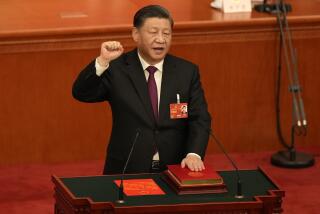Career Day in China
- Share via
BEIJING — A popular old jibe here summarizes the Chinese view of the 1949 change in their rulers: “The Nationalists have lots of taxes, the Communists have lots of meetings.”
Now, the Chinese Communist Party has become less like the rebel band it once was and more like the ruling group that preceded it.
But its Leninist penchant for big formal meetings--the grandest of which is the once-every-five-years National Party Congress--has never diminished.
The 15th such congress since the party’s founding in 1921 opens today at the Great Hall of the People. At the congress, about 2,000 party delegates will meet to ratify policy and personnel changes made by the party’s Central Committee.
Some of these events have lasted for weeks, some for as little as four days.
At this session, it will be all too clear that the late Chairman Mao Tse-tung’s generation of leaders, born at the turn of the century, is virtually extinct. The surviving contemporaries of late “paramount leader” Deng Xiaoping are doddering behind the scenes as advisors.
So the party will not only be juggling top jobs among its hierarchy and suggesting government personnel changes to be rubber-stamped by the parliament in March. It also will be promoting a new generation of politicians to take the reins of state power in the next century.
Among the headline-grabbing moves at this congress is likely to be the replacement of conservative Premier Li Peng by Zhu Rongji, who is credited with managing China’s economy.
And Wu Yi, 59, the “Iron Lady” who now serves as foreign trade minister, may rise to be foreign minister.
Meanwhile, analysts see an ascendant President Jiang Zemin, 71, grooming successors to succeed him as early as the next National Party Congress in 2002.
His main proteges are former Shanghai officials whom he promoted through the party ranks in the 1980s when he was mayor of the southern city.
Jiang’s chosen “fourth generation” leaders are typically male engineering graduates of Qinghua University--China’s version of the Massachusetts Institute of Technology--and are in their 50s. Their technical know-how dwarfs their revolutionary experience, personal charisma and ideological zeal. “Expect bland government by consensus from this crowd,” predicts one party member.
Jiang, at this congress, is also expected to try to install allies in key posts in the Central Propaganda Department, the anti-graft Discipline Inspection Commission and the State Council.
The party’s 20-member Politburo and 189-member Central Committee are also expected to induct his allies and regional heavyweights such as Jia Qinglin, his pick for Beijing mayor.
Jia replaced Chen Xitong, an opponent of Jiang who was stripped of his posts for embezzling public funds. This congress will announce Chen’s expulsion from the party, according to official media.
Facing retirement are several liberal officials tied to Jiang’s party precursor, Zhao Ziyang; Jiang’s rival, parliamentary boss Qiao Shi; and Qiao’s precursor, the late Peng Zhen.
Qiao’s future looks shaky: Insiders say he will lose control of the National People’s Congress but remain on the Politburo Standing Committee.
(BEGIN TEXT OF INFOBOX / INFOGRAPHIC)
COMMUNIST PARTY: Career Day in China
Jiang Zemin, 71. The former Shanghai mayor, now China’s president, is apparently in the ascendant now and will aim to install his technocrat proteges in powerful spots.
Li Peng, 68. The hard-line premier, known for bringing in troops to break up student demonstrations at Tiananmen Square in 1989, is expected to be moved aside.
Zhu Rongji, 69. This former Shanghai mayor, is believed to be the choice as China’s next premier.
Wu Yi, 59. As foreign trade minister, she has earned the nickname “Iron Lady.” But can she rise to the prestigious post of foreign minister?
KEY CONCLAVES OF THE PAST
1921: First Congress, held in Shanghai. Mao Tse-tung, who will become party chairman and head of state, represents his home province, Hunan. The secret party, with only a few dozen members nationwide, sets out to incite class struggle and seize state power.
1945: Mao, now party chairman, convenes seventh congress at his wartime base, Yenan. He calls for coalition government with the Nationalists.
1956: Deng Xiaoping uses the Soviet Union’s recent criticism of its leader, Josef Stalin, to launch an attack on what has become Mao’s “cult of personality.” Mao is relieved of minor posts. Sixty-one foreign Communist parties send representatives or greetings to China, now firmly in the Soviet camp.
1958: Marshal Peng Dehuai, the defense minister, criticizes Mao’s disastrous industrialization program, the “Great Leap Forward,” as “forced labor.” Mao denounces him and strips him of his posts, effectively silencing dissent within the party.
1969: A new party charter names Lin Biao as Mao’s heir and limits party membership by class origin. Lin parrots Mao’s doctrine of inevitable war--possibly nuclear conflict--with the United States and the Soviet Union, dismissing them as “paper tigers.”
1978: A resurgent Deng rehabilitates pre-Cultural Revolution allies and purges enemies. He calls an end to mass political campaigns and class struggle. He outlines plans to decentralize economic management, separate party and government, streamline bureaucracy and open the country to foreign investment.
Source: Times staff
More to Read
Sign up for Essential California
The most important California stories and recommendations in your inbox every morning.
You may occasionally receive promotional content from the Los Angeles Times.













